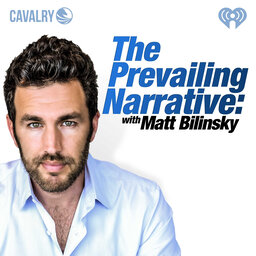Episode 16: Vodka, Hookers, & the Russian Mafia: An Insider's Account with Security Expert Joe Serio; Tom Brady Un-Retires; Zelensky Addresses Congress; Saudis Turn to China; Daylight Savings Time Permanent
0:11 - Intro
2:25 - Tom Brady un-retires, and other stories of star athletes having difficulty facing life off the field.
11:05 - Zelensky addresses Congress, and discussion of the prospects of a No-Fly Zone.
23:04 - Saudi Arabia turns to China in an expression of discontent with the Biden admin, while US allows Russia a $10 billion contract as part of the Iran Deal revival
35:56 - Daylight Savings Time made permanent - not such a great idea.
41:44 - Interview: Dr. Joe Serio spent years in Russia as a high-level security expert and gives us the insider's account of the current Ukraine conflict and what led to it.
In 1 playlist(s)
The Prevailing Narrative with Matt Bilinsky
A lively and fiercely analytical breakdown of news and current events, with interviews of thought le…Follow podcast
Recent clips

Episode 30: "Dark Plots & Secret Explanations": Study Rejects "Chemical Imbalance" as Cause of Depression (Max Lugavere Discusses); Biden & His Media Surrogates Re-Define "Recession; Kansas Abortion Ruling; Zelensky Poses for Vogue(?!); Public Health Lies on Monkeypox
1:38:34

Episode 29: Kamal Ravikant - Silicon Valley Thought-Leader, Investor, & Bestselling Author on Loving Yourself, Stepping Past Fear, Extreme Sharing, Investing Skills, and Living a Life of Honesty, Adventure and Authenticity
1:12:12

Episode 28: Political Scientist Wilfred Reilly on Gun Control, Targeted Solutions, and the Facts and Myths About Gun Violence in America; Nihilism and Mass Shootings
1:44:29
 The Prevailing Narrative with Matt Bilinsky
The Prevailing Narrative with Matt Bilinsky